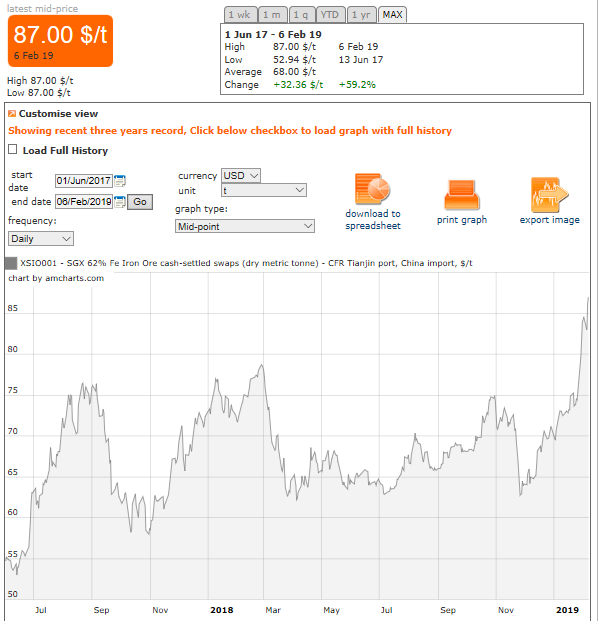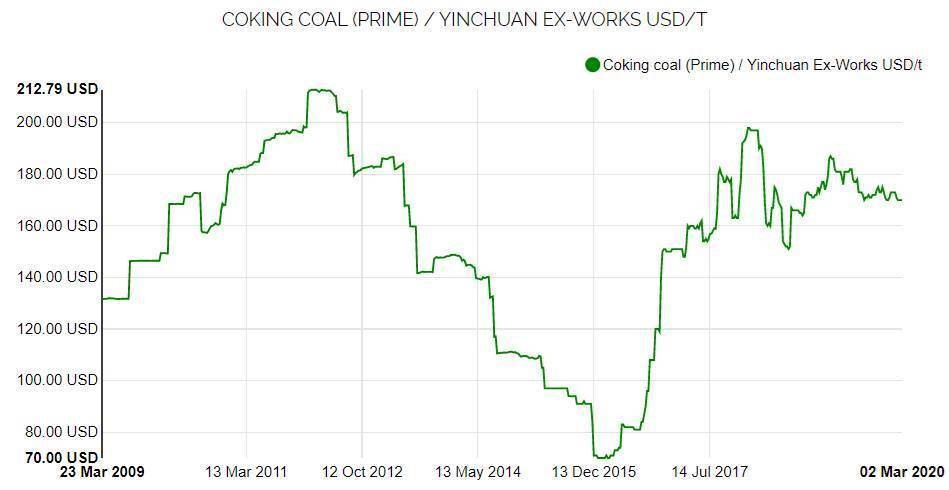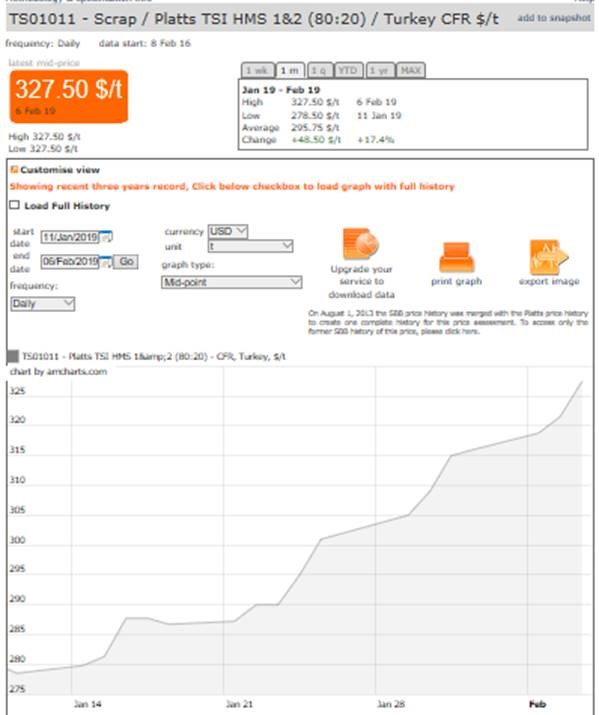Dear All Steels Customers
It is only at unprecedented times that we feel the need to
go to print on events that are having a major impact on steel prices and we have
again reached such a point in time.
As always for simplicity we will keep to straight forward
facts that are mainly in the public domain and leave you to make your own
judgement. From an All Steels perspective however we just feel it is
necessary to convey such news so that all our customers are forewarned as to
why our prices are rising with the added problem of stock outages on a number
of our key products that will be difficult to replace until early July 2019.
The issues are basically four fold: Iron Ore, Coking Coal,
Scrap & Safeguards. There is also the BREXIT factor to come into play
but this is such an unknown we are wisely keeping away from this debate.
Iron Ore
The catalyst for change on steel prices started with the
disaster that took place in Brazil on the 25 January 2019 with the collapse of
a major dam at Vale’s Córrego do Feijão mine. This was the second
Brazilian dam to collapse in 3 years linked to iron ore production. The
death toll on this occasion is likely to exceed 300 people and the severity of
the humanitarian and environmental disaster has prompted huge government
intervention.
As of this morning Vale declared force majeure on some iron
ore contracts after a court-ordered halt to a mine responsible for nearly 9 per
cent of Vale’s output. The force majeure came after a court on Monday
ordered it to stop using eight tailings dams, including one affecting
production of about 30 million tonnes of iron ore output per annum.
Numerous dams in Brazil are now coming under heavy scrutiny
and further mining operations could be suspended.
Iron ore prices have surged since the disaster, hitting
effectively a two-year high.
The graph below shows the rate of price change. There
are various published iron ore price indices / recordings but they all show the
same trend movement. The graph below is for: XSIO001 – SGX 62% Fe Iron
Ore Cash-Settled Swaps (dry metric tonne) – CFR Tiamjin Port, China import $/t.
What the graph below shows is over a 30% increase in iron
ore prices since the December year end. This equates to a $25 per tonne
movement but with 1.7t of iron ore required to make a tonne of steel this
amounts to a $42.50 per tonne impact on steel prices.

What is also known is that Europe is one of the large export
markets for Brazilian iron ore and with many of the European buyers being
forced to find new supplies quickly following Vale’s force majeure such action
logically suggests further upward price pressure will follow.
Coking Coal
The news of Monsoon weather conditions in Queensland
Australia is making world news headlines with the city of Townsville being
completely flooded as officials were forced to release floodgates at an
overwhelmed dam. Loss of human life was again experienced and at least
20,000 homes have been flooded.
The city’s streets are reportedly full of washed in
crocodiles and snakes and whilst this remains the main focus of the news feeds
the monsoon has now moved south into the Bowen Basin and heading towards McKay
where all the major Australian thermal coal mines and coal port terminals are
located.
There is plenty of web news live on this topic as the heavy
rains continue e.g.
https://think.ing.com/snaps/the-commodities-feed-heavy-crude-osp-raised/
A paragraph in this link reads as follows:
Coking coal disruptions: “Floods in Queensland, Australia have led to some
disruptions at coal mines and export terminals in the region. Queensland’s main
coal exporting terminal, Abbott Point has suspended operations, whilst Glencore
has also halted operations at its Collinsville and Newlands mines. This
comes at a time when there is plenty of uncertainty over iron ore supply,
following the recent Vale dam accident. Yesterday, Vale declared force majeure
on some contracts, following a court order to suspend 30mtpa of capacity.”
The events of the Australian
mines being hit by the monsoon is breaking news so the impact on coking coal
prices will not be known until early next week but the below reports generated
by Simpson Spencer Young show a $15 per tonne rise in coking coal prices over
the last 2 week period against a background of forecasters predicting a decline
in coking coal prices. (It is estimated that 0.7t of coking coal is
required to produce a tonne of steel).

Scrap
When any events in the world have a potential impact on steel
prices Turkish scrap prices always respond the quickest and most
aggressively. As a single price indicator the Turkish scrap price is
therefore an excellent barometer to watch.
Given the Iron ore and coking coal situation it is therefore
not surprising to yet again see a huge shift in Turkish scrap prices.
There is little narrative that is required to explain the
below. An upward shift in price of $49 per tonne in less than a month
with 1.1t of scrap required to make a tonne of steel.

This evening one of our major Turkish steel suppliers
refused to commit to an offer as scrap prices today moved up by the hour as
they were trying to buy and they are expecting more of the same in the lead up
to the weekend.
Safeguards
The impact of EU Safeguards only started to materialise in
the closing weeks of December as quota levels by product quickly started to
fill up. As All Steels Trading we had first-hand experience with a
December shipload of hollow sections that we quite simply had to bond to avoid
the risk of a 25% duty charge. On 2 February 2019 we entered a
new 5 month duty window and like many other traders we were busy customs
clearing our bonded cargos but the situation is very confusing and extremely
high risk going forward over the next 2 quarters.
We are sure most of you will be up to speed on EU Safeguards
but the below should help to clarify how the current situation is going to
result in All Steels Trading having stock outages during the first half of the
year.
For the purpose of explaining our issues we will focus
specifically on hollow sections even though we believe some other products have
bigger issues.
During the first EU Safeguard quota window that ran from 19
July 2018 to 1 February 2019 with an allowed quota level on hollow
sections of 387,343 tonnes for all non-EU suppliers. (The whole quota was
fully utilised).
The second EU Safeguard quota window runs from 2 February
2019 to 1 July 2019 but this time the quota is broken down by
country at the following levels.
| Country |
Tonnage Quota |
| Turkey |
154,436 |
| Russia |
35,406 |
| Former Yugoslav Republic of Macedonia |
34,028 |
| Ukraine |
25,240 |
| Switzerland |
25,265 |
| Belarus |
20,898 |
| Other Countries |
25,265 |
Our general concerns are:
1: The Turkish hollow sections quota is set at a low level
as it is based on a 3 year average trade level pre July 2018. In more
recent times Turkey has been a much more dominant supplier to Europe as Trump’s
50% import tariff on Turkish hollow sections effectively shut the door on
Turkish hollow sections exports to the USA. The Turkish EU Safeguard
quota is therefore expected to be utilised very early in this new window.
2: On 2 January 2019 many traders throughout Europe were
known to be bonding Turkish hollow sections just like All Steels Trading so we
believe that a huge loading against the allowed allocation is already in place.
3: It is also known that many traders have attempted to
front load the quota window just like All Steels Trading and have shiploads due
to arrive over the coming months. Again the number of such ships already
on the high seas heading towards Europe is known to be large and as each week
drifts by the chances of being hit with a 25% duty as the quota gets exhausted
becomes a huge danger!
4: The EU commission are struggling to reconcile
tonnage receipts due to the added complexity of also setting tonnes by
country. At present we have no visibility of where imports are against
the set quotas for any product and we are being advised by the commission that
it could take up until 19 February 2019 for them to get their system up and
running. All traders are therefore running blind with the risk of
retrospective duty charges being a real possibility on goods already imported
on certain products.
With such confusion All Steels Trading is finding it
impossible to buy non EU hollow sections for the sale of such goods prior to 1 July 2019.
If we bought more hollow sections today from Turkey we
either run the risk of paying out a 25% duty on arrival or if timing allows
putting such new material in bonding until 1 July 2019, which would
ultimately leave us letting customers down and incurring huge incremental
financing and warehousing costs. The bottom line is therefore on sizes
where we already have zero stock or zero remaining availability on our February
2019 ship this will remain our position until 1 July 2019. We
would also add that we are already seeing a high level of sales so we do
believe our stocks will soon become depleted.
We trust that you will appreciate this update and if you
have any queries please give me or one of All Steels Trading’s sales team
members a call.
Best regards
Laurence McDougall